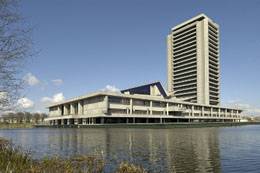Elections of the provincial council
The members of the provincial council are elected directly once every four years. The most recent provincial council elections were held on 15 March 2023.

The municipal executive of each municipality is responsible for the organization of the elections. Municipalities may decide to have the provincial council elections take place concurrently with other elections.
Number of members
The number of members of the provincial council depends on the number of inhabitants of a province. Hence, the number of councillors differs per province. At present, there are 570 provincial council members.
Overview of seats per province:
| Province | Number of seats |
| Groningen | 43 |
| Friesland | 43 |
| Drenthe | 41 |
| Overijssel | 47 |
| Flevoland | 41 |
| Gelderland | 55 |
| Utrecht | 49 |
| Noord-Holland | 55 |
| Zuid-Holland | 55 |
| Zeeland | 39 |
| Noord-Brabant | 55 |
| Limburg | 47 |
Eligibility to vote
A voter must meet the following requirements in order to be entitled to cast their vote in the provincial council elections:
- The voter must be a resident of the province concerned on nomination day
- The voter must possess Dutch nationality
- The voter must be 18 years or over on election day
Registration of political parties
Political parties desiring to register a new appellation (name) must apply for registration with the central electoral committee of the province concerned in time. Registration of an appellation is not required. A political party may also opt to participate in the elections as a so-called 'blank list'. Appellations already registered for the elections to the House of Representatives are in principle also registered for the provincial council and municipal council elections. Re-registration of those appellations is therefore not required in such cases.
Nomination
On nomination day, all political parties submit their list of candidates to the central electoral committee of the province concerned. Political parties participating in the provincial council elections for the first time and parties that failed to gain a seat in the previous provincial council elections are required to pay a deposit. In addition, new parties, and registered parties that failed to gain a seat in the previous elections, must submit 30 declarations of support. When drawing up their list of candidates, political parties may make use of the Election Supporting Software (ESS).
Polling stations
Polling stations are open from 7.30 a.m. till 9.00 p.m. Only special polling stations may open their doors at an earlier time. No station may be open after 9.00 p.m. As many polling stations as possible, but no fewer than 25% of the total number, must be in buildings accessible to voters with a physical impairment and be in a location that is easy to reach for such voters.
Casting a vote
Everyone eligible to vote will receive an invitation to cast their vote sent to their home address no later than fourteen days prior to election day. This invitation includes their poll card. The poll card allows the voter to cast their vote in the polling station of their choice within the municipality's borders. Holders of a voter card may cast their votes anywhere within the area to which the elections apply. In the case of provincial council elections, this area encompasses the entire province.
Voting by proxy
Voters unable to cast their vote in person on election day may have their vote cast by proxy.
Identification
All voters casting their vote must show identification to identify themselves. Any such identification may not have been expired by more than five years on election day.
Election results
Generally, ANP Netherlands National News Agency publishes the provisional election results on the evening of election day itself. The official election results of a province are determined by the central electoral committee of that province at a later date. The results of the elections to the provincial councils are stored in the Electoral Council's election results database.
Appointments
The members of the provincial council are appointed by the central electoral committee of that province. The provincial council will subsequently assess whether an elected candidate may hold a seat. A so-called examination of credentials is conducted to determine whether the candidate meets the membership requirements, and whether they do not hold any positions incompatible with being a member of the provincial council.
Overview of provincial councils
The Netherlands is composed of 12 provinces. The Dutch Constitution states that the highest authority in a province is held by its provincial council. The provincial council's primary task is to supervise the provincial administration by the Provincial Executive. The Provincial Executive is responsible for the province's day-to-day administration. The Executive is chaired by the province's King's Commissioner and has between three and nine other members. The King's Commissioner chairs both the provincial council and the Provincial Executive. The members of the Provincial Executive are appointed by the provincial council. The King's Commissioner is appointed by the National Government and holds office for a period of six years. One of the special powers of the provincial council is the election of members to the Senate. These elections are always held within three months of the provincial council elections.
Island Council elections on Bonaire, St Eustatius and Saba
As of 10 October 2010, the Netherlands Antilles have ceased to exist as a country. The islands of Sint Maarten and Curaçao now each constitute an independent country within the Kingdom of the Netherlands. The islands of Bonaire, St Eustatius and Saba (the 'Caribbean part of the Netherlands') hold the status of special municipalities. Simultaneously with the provincial council elections in the European part of the Netherlands, these latter islands hold Island Council elections.